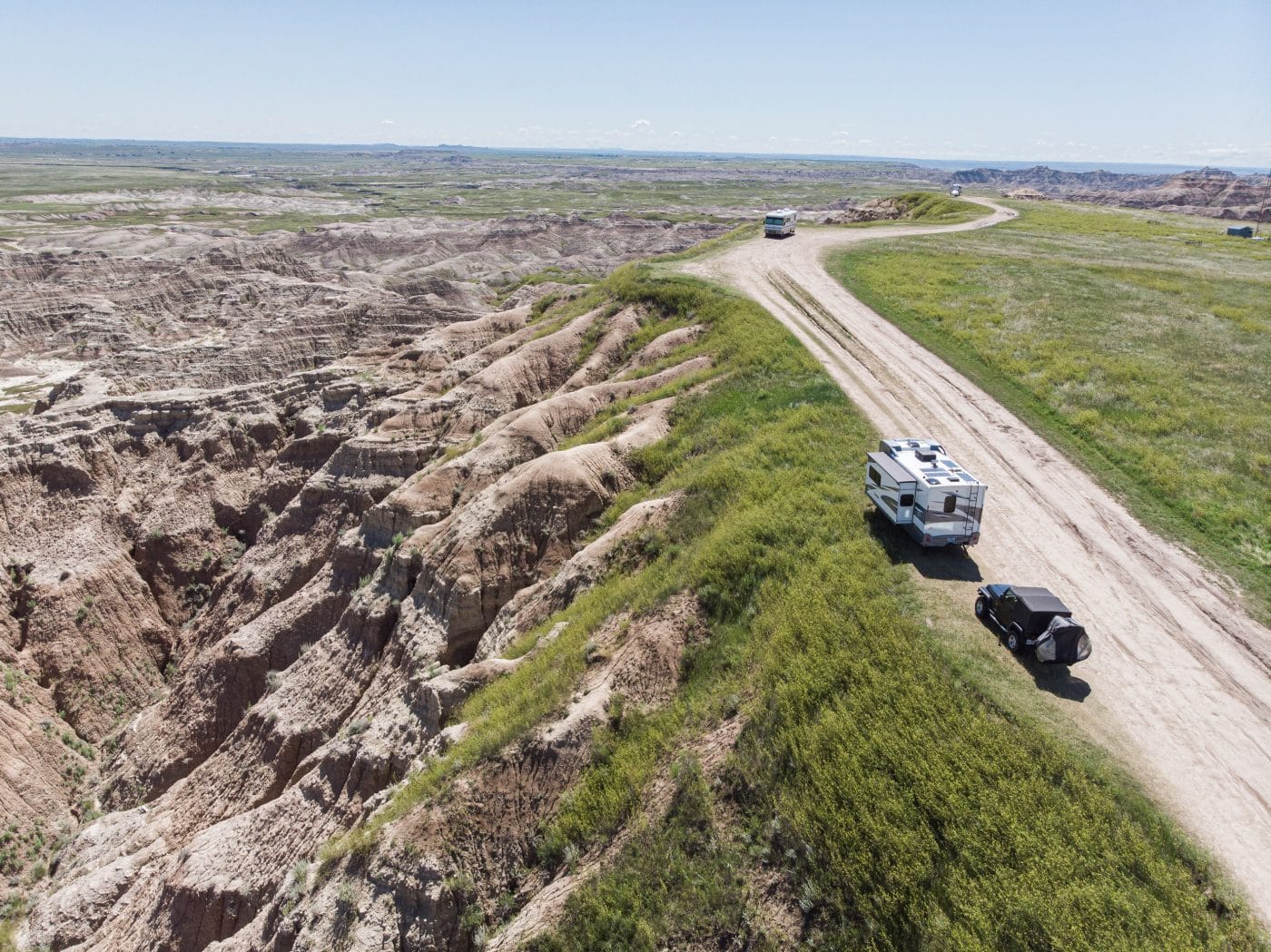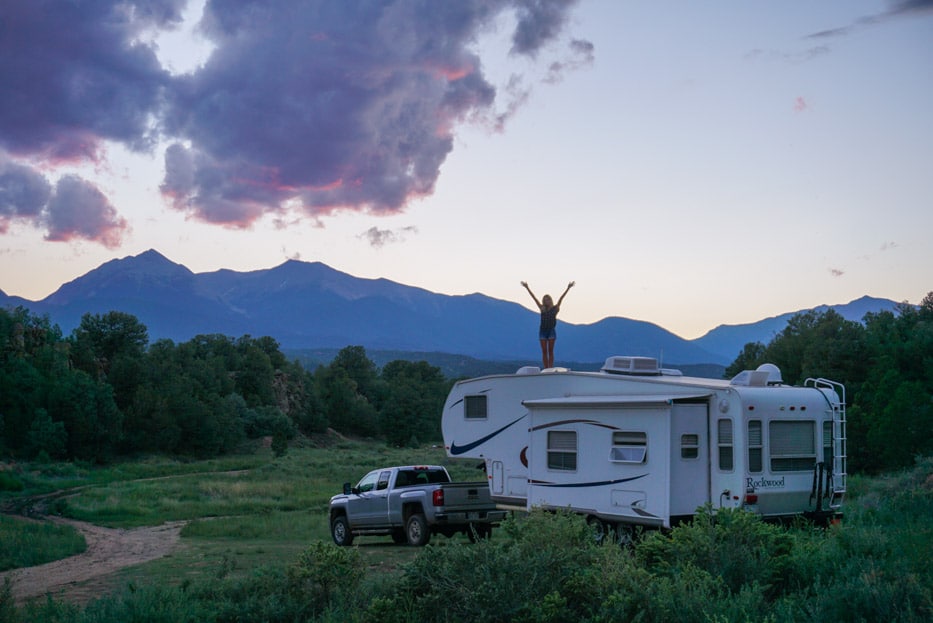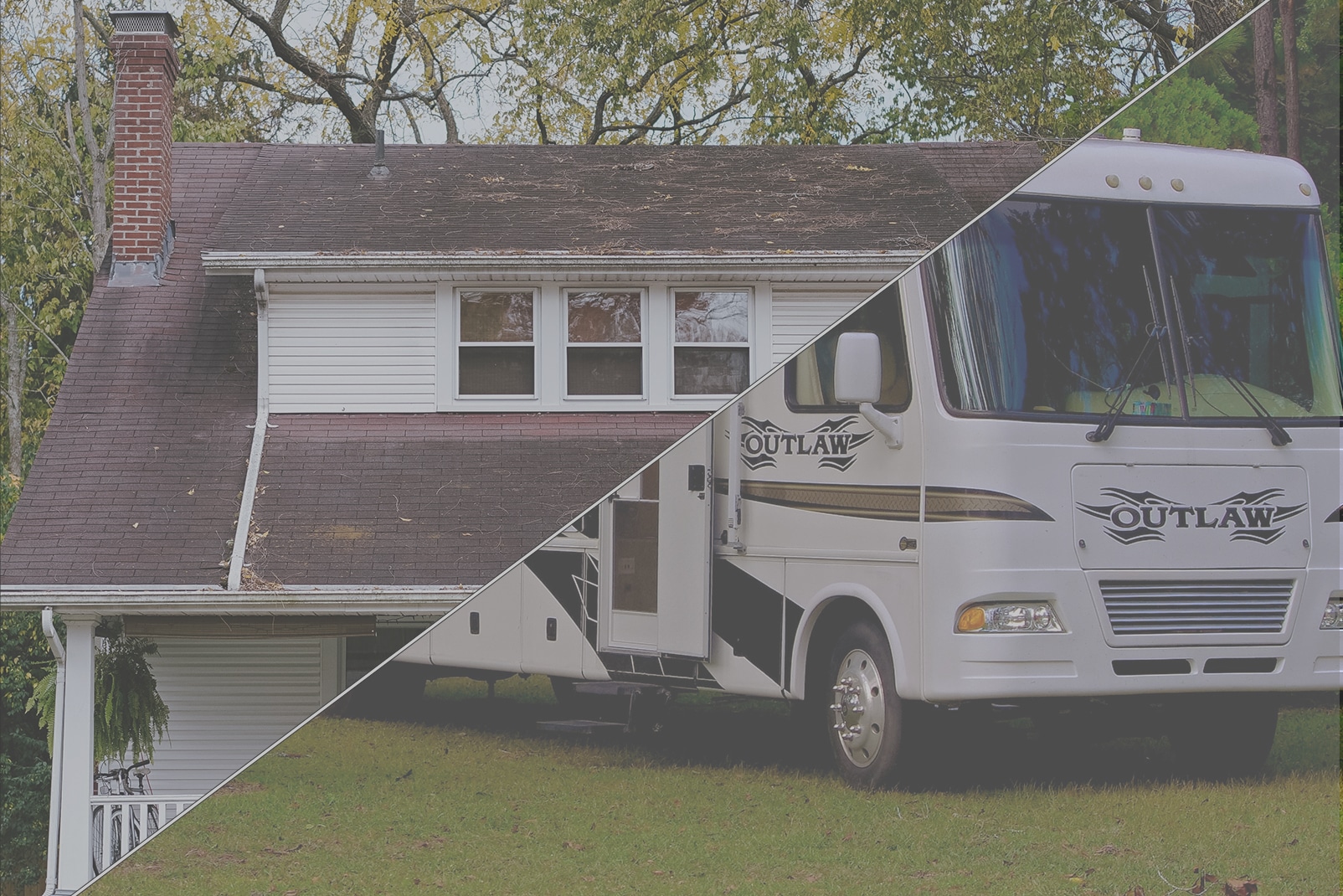Many people that read our blog are looking for information on how to become a full time RVer. If that sounds like you, be sure to check out our free email course and then bookmark this article for later 🙂 . If that doesn’t sound like you, you’re probably reading this article because you’ve either recently stopped full-timing or you’re thinking about it.
It may sound strange, but for us and for many others that have spent time as full-time RVers, transitioning away from the lifestyle was more difficult than transitioning into it. Maybe not logistically since there is a lot to do before you can full-time, but for sure emotionally. For us, the prospect of going back to a “normal” life filled us with anxiety.
How to Transition Away Full-Time RVing

There are many great bloggers and Youtubers sharing tons of information on how to get into RVing and how to make the most of it. But, we rarely see people talking about getting out of it – going from the full-time RV lifestyle back to a sticks and bricks or more stationary lifestyle.
But, now that we’re on the other side of the transition (we’re so close to launching as part-timers 🙂 ), we wanted to share our thoughts and provide some 4 tips that helped us navigate this part of our journey.
Why is It So Difficult?
Before we dive in, it is important to point out that the transition is difficult for many, regardless if others think it “shouldn’t” be. There are always challenges and emotions when you make a major life change. When it comes transitioning from full-time RVing, most people around you won’t understand what you are going through. They won’t be able to appreciate the challenges as they’ll think it should be “easy” to go back to a lifestyle you’ve already experienced before.
Sure, okay. That makes sense. But, while your old life might be familiar, you have changed dramatically through your RV journey. A different you added to an old life is a recipe for discomfort.
Here are some other reasons why the transition can be hard for many.
Loss of Identity
When you’re a full-time RVer, it becomes a major part of your identity. Its amazing how often in a quick conversation somebody will ask you where you are from or what you do. For us, both of these questions typically lead to us explaining that we live in an RV full-time and travel while we work. That generally lead to more and more questions. It seemed like we weren’t even able to even fill up the gas tank without someone wanting to talk about RVing! All of the sudden, you start identifying as a full-time RVer!

If we’re honest, it is exciting and fun to have an interesting or different story to tell others. It is easy to let your status as a full-time RVer have a big impact on your identity. Living in an RV becomes a major component of who you are and what you’re about, especially, if you’re experience with full-time RVing is changing you for the better. We loved who we “were” and felt like the RV was the reason.
Losing this part of our identity was really hard for us to deal with. We were scared and thought if we’re not full-time RVers anymore, than what are we?
This can be even more unnerving if you’ve incorporated RVing into your professional life. We have a website and social media accounts that are centered around traveling and RVing, we’ve worked with many companies in (and outside) the RV industry. The thought of our hard work going to waste because of a change to our living situation was scary and overwhelming.
Loss of Adventure

Full-time RVing is so much fun and we had so many incredible adventures during our time. All you have to do is look at our RV route page to see that we’ve been and done some amazing things. Full-time RVing allowed us to be a part of the Happy Camper Bucket List, a travel series we did in partnership with Camping World, which was absolutely AMAZING! Full-time RVing is a wonderful journey full of adventure!
Losing the opportunity for adventure on a daily basis can be a tough pill to swallow.
Loss of Community

A surprising aspect of full-time RVing is the unbelievable RV community. In an ironic twist, we found it easier to meet and connect with folks living in a home on wheels than we did living in the suburbs. It’s easy because most people living full-time are actively seeking others to build community with and you have a shared connection – something in common – as soon as you meet.
When we arrive in a new place, it’s common to get messages from people in the area that want to get together. Of course not every meetup leads to deep friendship, but many of them do.
It takes a certain kind of person to want to live in an RV and travel full-time, and having the chance to continually meet like minded people is a major benefit of the lifestyle. Giving that up is difficult.
4 Ways to Make the Transition Easier
1. Understand the RV is Just a Vehicle
Of course the RV is a vehicle – what kind of advice is that? Hold on just a second so I can explain.
We like to say that we are better people when we are in the RV. We feel more creative, more energetic and more willing to get out of our comfort zone.
What we had to realize, however, was that the RV is just a vehicle that made it easier to do or feel the those things. The RV did not give us super powers that made us more creative or better able to try new experiences. The RV did not solve all of our problems or do anything other than providing us a mobile home, WE were/are the reason that those things are true because we take ACTIONS that make us more creative, more deliberate, etc.
2. Live As If
Make the transition easier by “acting as if” you still are full-timing. Upon our return to a sticks and bricks home, we made a concerted effort to do activities that we’d do if we were traveling – only at home.

Take photos, try new restaurants, be open to new relationships, go on new hikes, take days trips etc. These activities are common for us when we are on the road, but less common when we are at home. We found that doing those things made us happier and allowed us to really enjoy the town in which we settled. Once you return to sticks and bricks, give yourself a challenge and try to do many of the same things you did while traveling.
3. Move Forward with a New Dream
We’ve found that the most important thing you can do to ease the transition out of full-time RVing is to focus on a new dream. Whether that dream has anything to do with travel or not, you’ll feel more invigorated if your actively working towards something.
There’s at least one reason that you are going back into a “traditional” lifestyle. Regardless of the reason, your time RVing has probably impacted or changed you in a way that you don’t want to lose. It’s good to take some time and think about that and evaluate how that affects your long term goals.
Perhaps you’re stopping because you’re not able to make the finances work. Or, maybe your health is causing your to get off the road, or maybe you miss your friends and family.
If you have a desire to return to RVing or another form of travel, anyone of those examples might lead to significant changes to your goals.
Maybe you’ve decided to start a business that could allow you to earn higher income. Perhaps you’ll commit to finding a remote job and choose to enroll in a course that can help you locate it. If you’re health is the problem, maybe your goal is to change your diet and exercise more, or do whatever it takes to overcome your situation so that you can return to what you love.
4. Embrace the Change
Focusing on a new goal or dream is really important. Achieving those goals may take time, though. In the short term, finding ways to embrace the change can allow you to enjoy the transition rather than feeling unsettled by it.
When we first came off the road, we found ourselves noticing small things that made us really happy. Silly things, maybe even stupid things, but these little things helped us to embrace the big lifestyle changes we were going through.
For example, when we moved into our apartment, we purchased a new desk that both of us could work from. We couldn’t believe how much we enjoyed having a chair that reclined or a desk that was at the right height for typing, or a dual monitor setup. Don’t even get us started on the shower or the size of our apartment refrigerator! It was a small delight every time we went grocery shopping and knew we’d have space in the fridge for the orange juice!

We love RVing and are always happy to accept the sacrifices that come along with it, but focusing on the little things that are not available when traveling was really helpful
Our Reasons…
We had two primary reasons that we stopped full-time RVing. The first reason was that Dan’s mom was facing health issues and we wanted to be closer to her. The second was that we needed a permanent residence in order to grow our family through adoption.
You see, for many of us that have come off the road, it is not about stopping, but rather figuring out what is next to continue building a life you love.
Our time RVing reinforced the importance of having flexibility with our work, which allowed us to spend quality time with Dan’s mom. Also, RVing full-time made us fall even more in love with traveling. It only strengthened our resolve to make travel a major part of our life, even with kids.
To make it happen, however, we had to re-valuate our dream and start working towards a new goal – part-time, full-time travel.
We want to be able to travel where we want, for as long as we want, and most importantly, when we want. We also want a place to come home to where our family can find routine and where we can establish roots. We want it all and in order to do that we need to think in terms of “and” instead of “or”.
Conclusion
Like for many others, the transition back to a “traditional” lifestyle was challenging. We felt like our we’d lost part io our identity and missed the constant adventure that’s easily available to those on the road.
We learned, however, that there are things that you can do to make easier when you do decide to come off the road full time. By focusing on new goals and by choosing to live like you’re still traveling, you can not only make the transition smoother, but ensure that the you carry forward the things that you gained from full-time RVing.
What do you think? Have you made the transition from full-time RVing back to a more stationary lifestyle? How did it go for you? Let us know in the comments below!


